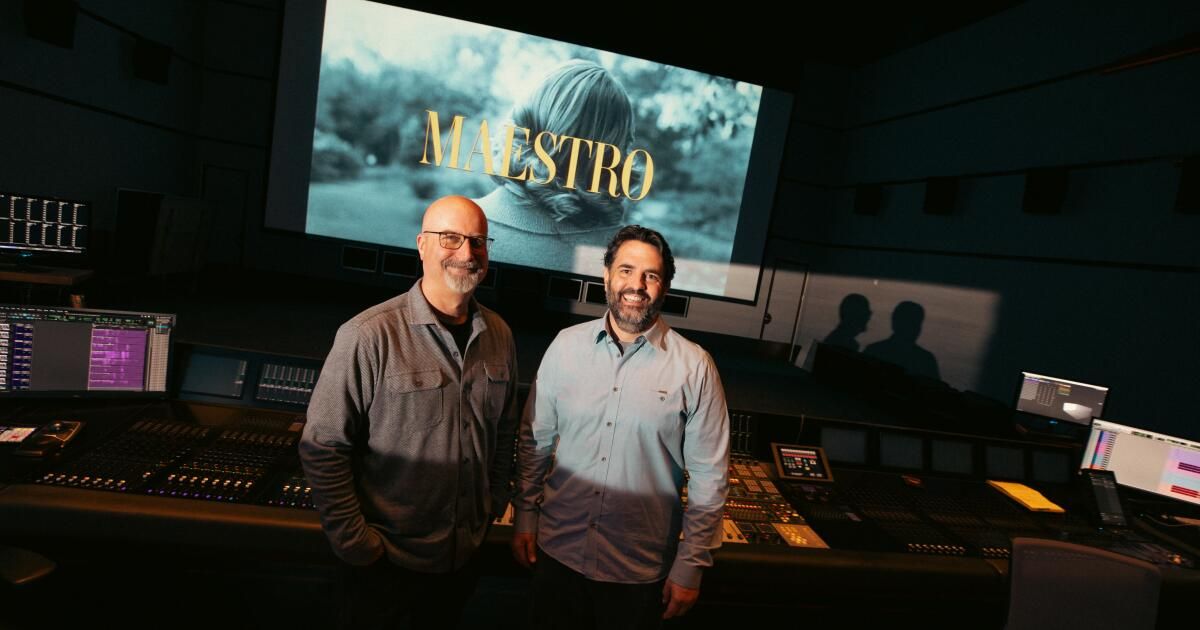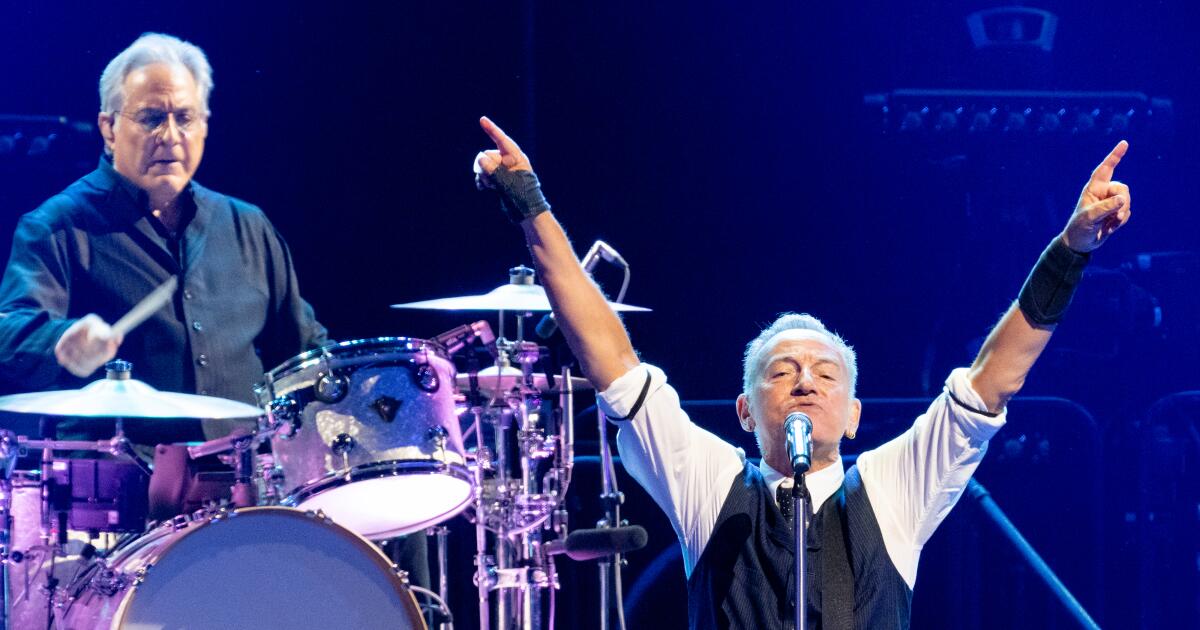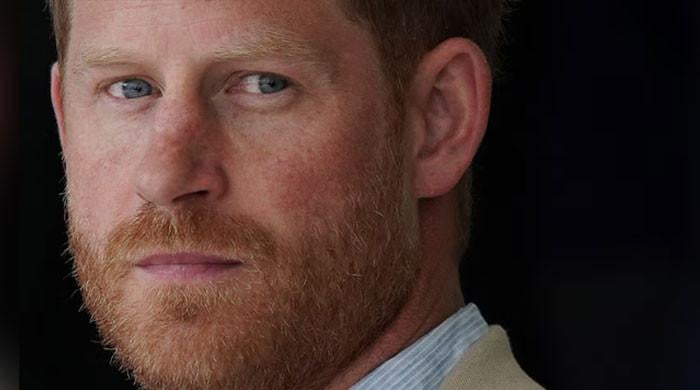It should have been an easy job for the “Maestro” sound team: Mahler's Resurrection Symphony played at Ely Cathedral in England. Typically, they would pre-record the music and play it back while the musicians and director Leonard Bernstein (played by Bradley Cooper) mimed. But that's not how Cooper, also the film's co-writer and director, wanted it. He had been working on directing for six years and felt that the performance would be more authentic if he actually directed the piece.
The sound mixer on the set, Steven Morrow, remembers it as a terrifying proposition: miking 200 members of the choir and orchestra playing live in an echoing cathedral. Then, he met with re-recording mixer Tom Ozanich, with whom he had also worked on Cooper's “A Star Is Born.” In that movie they recorded all the singing live, but this was different.
“With voices it's harder to fake it,” Morrow notes. “With music you can pretend a little. But the overall experience with this performance and the orchestra playing this music jumps off the screen because it's real. And the whole movie plays that way, where it's real. If you cheat on him, you lose some of that.”
They had three days to get it. As well as their own Dolby Atmos microphones on timpani, trumpets and opera soloists, they hired Classic Sounds of London, who had already miked Ely Cathedral. In total sixteen microphones were installed, some of them suspended from above.
Bradley Cooper directs as Leonard Bernstein in “Maestro.”
(Jason McDonald/Netflix)
“The first day was a failure in the management aspect,” Ozanich recalls. He is nominated twice this year, for “Maestro” and “The Creator,” bringing his total Oscar nominations to four. “Bradley was really good at having the instinct to know that he wasn't great. And the London Symphony Orchestra is good enough to ignore it and go ahead and do its thing. Then he came in and said, let's do it again. Let's do a long shot of Technocrane. And the orchestra came up to him afterwards and said. “That was it, you really directed it.” So, I think that's where the decision to go live versus fake it, because he could feel it in his own performance the day before, wasn't as good.”
The film's scene is more or less the shot described by Ozanich: a six-minute Technocrane shot in which Cooper directs, interspersed with B-roll of musicians and choir members. It's an uplifting and deceptively simple reproduction of the original 1973 performance with the camera moving to the music.
The other big challenge of the film came with the party scenes, of which there are many. The usual method is to mic directors and place group effects in post. Not in “Master.” The group scenes here required everyone to have a microphone. Cooper had seen a movie Morrow and Ozanich made with Jason Reitman called “The Front Runner,” where they miked everyone in crowd scenes and requested the same thing.
“When you ask people to pretend to talk, they exaggerate too much when they do it because they're not really doing it,” Morrow says. With so many people talking at once, they filter into each other's microphones, causing headaches. “Other microphones pick up someone and that does some weird things to the sound. So, you have to be able to dodge those things. And the group and the effects that build up there help round it out and give us some layers of depth.”
“It's an avalanche of audio,” laments Ozanich. “It's a lot of dialogue because you're stuck in it and when you go back and forth between takes, there will be jumps.”
The audio was orchestrated throughout, like a symphony, including every detail, from the rhythmic delivery of Cooper's lines (which he kept up between takes), to the birdsong in the background of a bucolic setting, to a sudden gust of wind. This close attention to artistry is part of what earned the film seven Oscar nominations in total, including best picture and lead actor for Cooper.
“He's very interested in collaboration rather than workers doing their jobs,” Ozanich says of Cooper. “He wants you to have an opinion, to have some opinion and to participate in it. I saw him learn very quickly in 'A Star is Born'. You could tell he was becoming a student of sound. He was trying to understand it.”
Both Ozanich and Morrow were nominated for “A Star Is Born” and Ozanich received another for “The Joker.” They are currently working together on “Joker: Folie à Deux” and Morrow is working on “Juror #2,” reuniting with Clint Eastwood, with whom he worked on 2018’s “The Mule.”
“We do a tight set to make sure we don't waste valuable time,” he says of working with the 93-year-old icon. “Everyone is on the same page trying to get what they want.” As for Eastwood's legendary one-take method, he says, “I've always heard that, but working with him, he'll be happy to take one or two more. What if the actors said can I get another one? No problem. He gives them to them. But for the most part we don't do many takes. Clint is very focused on what he wants.”
For Ozanich, the recognition from his peers that comes with a nomination is a reward in itself. “There are so many great artists and people in this business who inspired me and I admire the work they did. And for those people to say, 'Wow, you did a great job on this!' That's the prize. 'Maestro' is a unique sound work and you never know if people will understand it or appreciate it for what it is. So, I think that would be the most important thing. Wow, they got it.”
Morrow's first nomination was for “La La Land.” “When we lost, I was devastated for weeks because you figure that's it, I'll never be nominated again. Then it happens a few more times and now, I don't know, you'd have to ask me after the win, if we won. But I feel like it's a special experience to be included in the discussion about what people found cool during the year. For me that's all. You look at a guy like Bradley who's been nominated 12 times and hasn't won. I don't think that diminishes the amount of sacrifice he made to get there. I think that's the same for all of us. But you hope the producers who normally hire you don't suddenly think you're paying double, because they'll never hire you again.”












